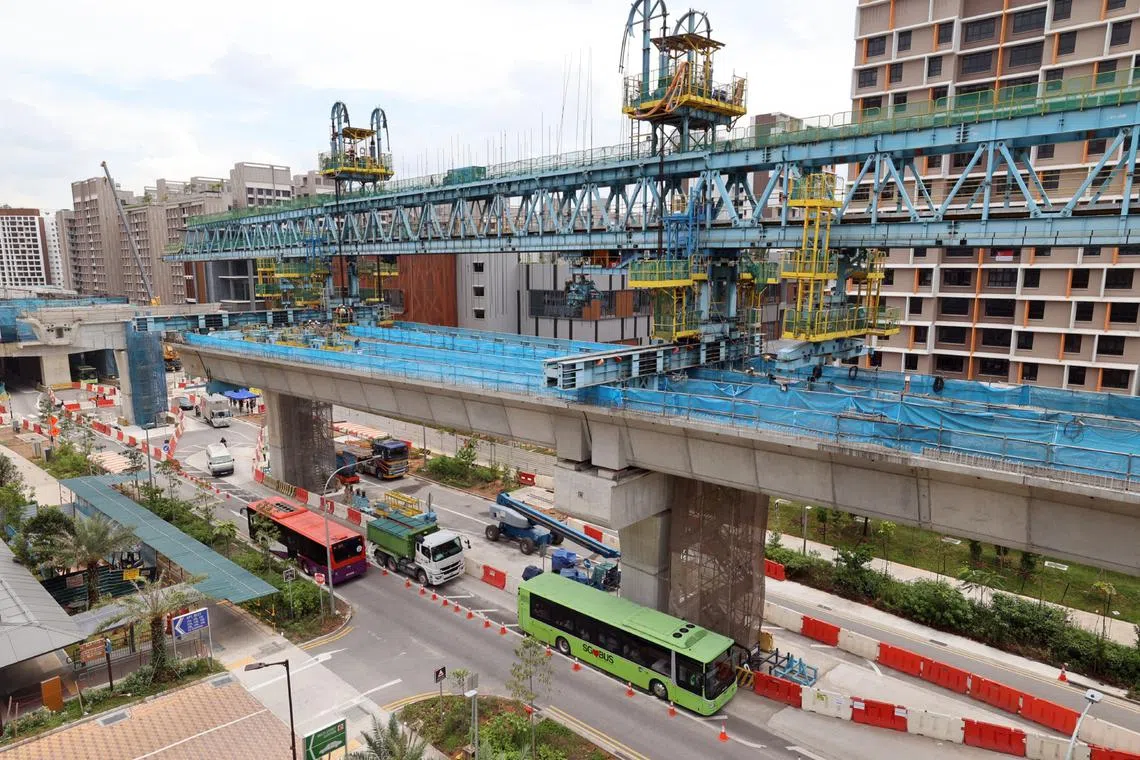SBS Transit, French firm RATP Dev to operate Jurong Region Line
Sign up now: Get ST's newsletters delivered to your inbox

The 24km Jurong Region Line will be the seventh MRT line in Singapore, connecting key areas in the western part of Singapore.
PHOTO: LIANHE ZAOBAO
SINGAPORE – A joint venture between train operator SBS Transit (SBST) Rail and French transport company RATP Dev Asia Pacific has been appointed the operator of the upcoming Jurong Region MRT Line (JRL).
This is the first time that a foreign operator will be involved in Singapore’s rail industry, said the Land Transport Authority (LTA) on Nov 28.
RATP Dev Asia Pacific is a subsidiary of French public transport operator RATP Dev.
The contract is for nine years, with the option for LTA to extend its licence for two more years. The JRL, Singapore’s seventh MRT line, will open in phases from 2027.
The service fee quoted by SBST and RATP Dev Asia Pacific to operate the line for 11 years came to about $750 million.
LTA said the bid submitted by the joint venture was 8 per cent lower than the other bid by rail operator SMRT Trains.
LTA said SBST and RATP Dev Asia Pacific have committed to using the French company’s experience to build local capabilities in rail operations and maintenance.
This is not RATP’s first attempt at entering the Singapore transport market.
In 2001, a related entity, RATP International Investissement, joined hands with Trans-Island Bus Services to bid for the Marina MRT Line – the first stage of what is now the Circle Line, which went to SMRT.
RATP and fellow French transport operator Transdev Group were also unsuccessful in their efforts to clinch two government bus contracts in 2015.
The tenders to operate the JRL and the upcoming Cross Island Line (CRL), Singapore’s eighth MRT line, were both called in May 2023. The CRL will start operating in phases from 2030, serving existing and future developments in eastern, western and north-eastern Singapore.
LTA said on Nov 28 that it has decided against awarding the CRL contract for now, as it assessed that the “tenderers’ proposals have not adequately reflected the uncertainties of operating the line when service commences in six years’ time”.
When contacted by The Straits Times, LTA said it was unable to reveal more details about the proposals, as they are commercially sensitive.
It said it will choose the CRL operator later. “The procurement plan for the CRL operator will be announced at a later date, when details of the entire line have been decided,” added the authority.
SBST Rail and SMRT Trains, Singapore’s incumbent operators, had been invited to submit bids for both MRT lines. Foreign operators were allowed to take part through joint ventures, but only as minority partners with less than 25 per cent shareholding.
LTA evaluated the tender submissions using a “two-envelope process”, which considered both quality and price factors. Price submissions were assessed only after the quality evaluation.
The authority said both tenderers submitted quality proposals that showed their ability to operate and maintain the JRL, while offering “added value to commuters and enhanced resilience for the rail industry”.
The tenderers also committed to more placemaking initiatives and community engagement efforts. Placemaking refers to proactively managing a place to make it better.
LTA said that, given the uncertainties surrounding ridership and fare revenues in the initial years of operation, the Government will bear the fare revenue risk during the first nine-year licensing period of the JRL.
The joint venture will be paid the service fee to operate the line, while the Government will keep the fare revenues.
The authority said a framework is in place to encourage good performance on the part of the operator in areas such as service reliability, customer satisfaction, and operational and maintenance processes.
This is on top of licensing and regulatory requirements on service and maintenance performance that the operator must follow. In return, the operator will get an incentive payment for exceeding the targets, or on the reverse, have its service fee deducted if performance is below par.
This arrangement is similar to the one used for the Thomson-East Coast Line, run by SMRT.
The 24km JRL will connect key areas in the western part of Singapore, including the Jurong Industrial Estate, Jurong Innovation District and Nanyang Technological University.
The 24-station above-ground line is slated to open in three stages, from 2027 to 2029, with an initial ridership of 200,000 daily in the initial years. This is expected to grow to more than 500,000 a day in tandem with developments in the areas it serves.
In a statement, SBST group chief executive Jeffrey Sim said the joint venture is committed to investing in innovative and smart technologies to improve the reliability, safety and sustainability of its services.
“We aim to not only meet but also exceed the high standards expected by our commuters,” he added.
Mr Henri Pottier, RATP Dev’s chief executive in the Asia-Pacific, said the expertise of the parties will ensure that the JRL meets the highest standards of reliability, innovation and integration with Singapore’s broader transport network.
In response to ST’s queries, SMRT Trains president Lam Sheau Kai congratulated SBST on securing the rights to operate the JRL.
“Although we missed this opportunity to serve commuters on a larger scale, SMRT remains steadfast in our commitment to delivering safe, reliable and comfortable journeys across the lines under our care,” he said.
At present, SBST operates the North East and Downtown MRT lines as well as the Sengkang-Punggol LRT, while SMRT runs the North-South, East-West, Circle and Thomson-East Coast MRT lines and the Bukit Panjang LRT.



